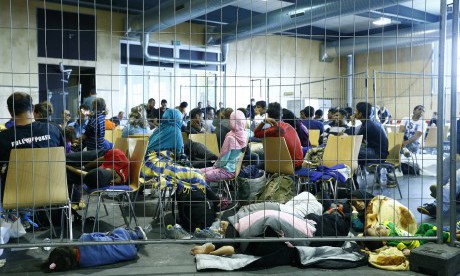As dawn breaks, ghost-like figures with sunken heads laden with babies, bundles of food and clothing can be seen trudging slowly along the autobahn.
Alongside the usual tips on tailbacks and delays, traffic bulletins on the local radio alert drivers to “pedestrians who have been spotted on the A3 between the Austrian border and south Passau”.
The scenario is not a one-off, but has become a familiar sight for the residents of the southern German town of Passau, as people traffickers drop off a daily average of 700 refugees – mostly Syrians, Afghans and Iraqis.
As soon as the smugglers’ vehicles have crossed the border between Austria and Germany, they abandon the refugees in woods, fields, secluded farms, and even on the hard shoulder of the motorway.
Warning signs have now been erected and speed limits introduced after a serious accident last week in which five Syrians were injured, one seriously, after being hit by a car.
The traffickers – believed to be mostly from Romania and Bulgaria – take advantage of the dark to escape, discarding most of their vehicles in which they have typically travelled in convoy to Germany, having crammed as many people as they can into each car.
Often the first the police get to hear about them is in early morning calls from locals who find the exhausted migrants sitting on their front lawns.
“It happens regularly that someone puts on the coffee machine and pulls up the blinds to find 20 or more people in the garden, desperate for water,” said Frank Koller, a regional spokesman for the federal police.
He said all indications are that the amount of arrivals is only going to increase. “A month ago we had 400 a day, now it’s 700, and I don’t think we’ve even reached the tip of the iceberg yet,” he said. Continue reading
Sources
- The Guardian — article by Kate Connolly, the Guardian and Observer’s Berlin correspondent.
- Image: Business Insider
